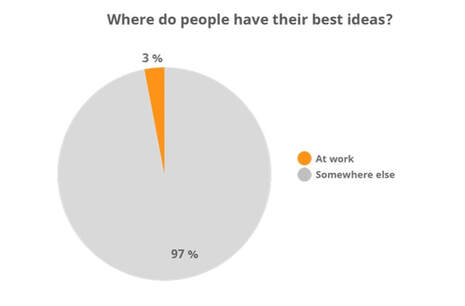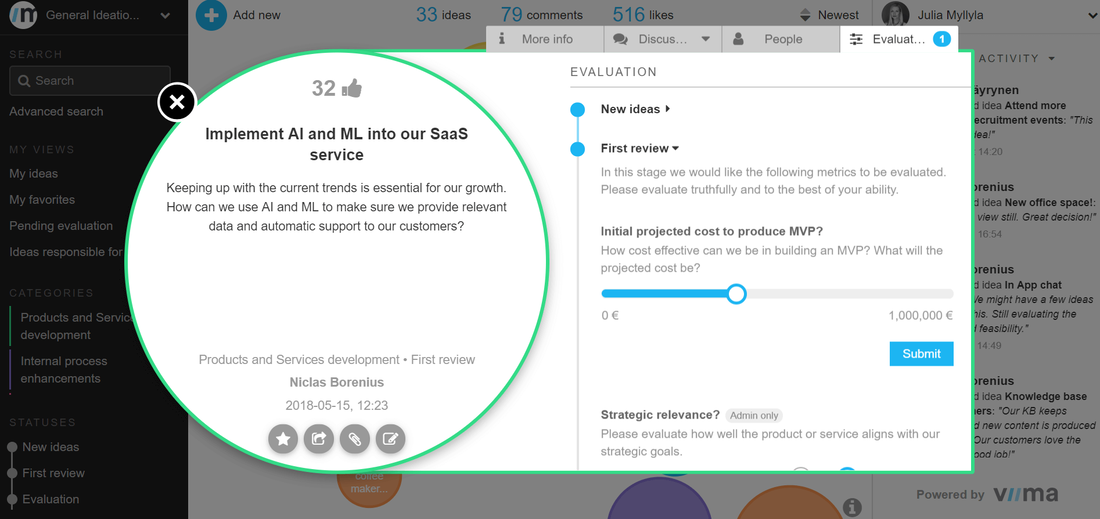|
In the first part of our guest post series, we talked about the common challenges companies face when transforming the company's culture. In this post, we’ll clarify how a dedicated innovation management tool can help drive more innovation in your organization. We’ll also introduce the most significant benefits you can achieve with the right tool. More ideas lead to more innovationSuccess in innovation requires a systematic process for generating, evaluating, prioritizing and validating new ideas. Although no tool will automatically make innovation happen, it can be a tremendous help in the process of turning new ideas into innovations. The right tool supports the entire innovation process from the beginning to the end and encourages employees to come up with more ideas. More ideas lead to more innovation, and although it’s the execution of those ideas that matters, generating new ideas is the first step towards any kind of progress. Benefits of an innovation management softwareA simple idea management tool is suitable for a wide range of different innovation activities to drive business results in your organization. Having just one versatile tool for managing ideas adds value to the process in several different ways. 1. Accessibility and real-time resultsDid you know that 97% of people get their ideas outside of the office? Because the majority of ideas are generated somewhere else than at work, you shouldn’t limit the possibilities to participate in the process. To get as many ideas as possible, innovation should be accessible for everyone regardless their location. Compared to a physical suggestion box, for example, online tools allow people to submit ideas on the go and respond to feedback immediately. All employees can access the same information whenever they like. When they can see the real-time impact of their own activities, it may encourage them to be even more active in the future. 2. Increased transparencyThe biggest problem with closed suggestion boxes or traditional surveys is that they lack transparency. Once you submit your idea, you have no clue what will happen next and if your idea is ever going to be implemented. Although there is a time and place for gathering feedback via surveys, these types of closed methods aren’t the best options for continuous ideation. An innovation management tool increases transparency as you can see the status of each idea at one glance. People are going to be more willing to share their improvement suggestions when they know that their ideas will be seen and that they can affect the progress of their own ideas. Another benefit of a transparent tool is that it allows you to assign responsibility. When everyone knows who is working on a certain idea, the person responsible for the idea becomes more motivated to advance it. 3. Improved mobility and operationsThe right tool makes it easy to prioritize ideas and pick the right ones to progress. It helps you analyse your process to identify and eliminate bottlenecks. With the help of the right tool, you’ll be able to fix inefficiencies faster and more efficiently. This saves you time and money, increases your profitability and allows you to produce more of the results your customers demand. When your entire team can evaluate, refine and develop ideas together, you’ll improve engagement, organizational learning, communication and the sense of fairness. 4. Cultural improvementsImproved transparency, communication and active collaboration are eventually going to have positive effects on the company's culture. One of the most important benefits is that an innovation management tool allows you to recognize and reward the most active participants. How you decide to reward your employees is entirely up to you, but you should always try to give positive feedback and acknowledge people for the improvements they’ve made. Positive feedback truly helps your employees thrive as it makes them feel their input is valued. This again can lead people to become more confident in their competence. When people feel they’re a valuable part of the continuous improvement process, they’re likely to keep giving better ideas. Wrapping up Although an innovation management tool brings a number of direct and indirect benefits to your innovation process and other parts of your business, implementing a dedicated tool only advances your business if the ideas are actually developed and put in practice. Innovation is a continuous process and the right tool helps manage it more effortlessly and effectively. If you don’t yet have a tool for managing ideas in your organization, you can now get started with Viima for free. This is the second part of Viima’s guest post series for KISMC. You can have a look at the first article where we talk about the common challenges organizations face when transforming the company's culture and how to overcome them. About the author  Julia Myllylä Julia represents Viima, the best way to collect and develop ideas. Viima’s innovation management software is already loved by thousands of organizations all the way to the Global Fortune 500 and is free for up to 50 users. She’s passionate about helping leaders drive innovation in their organization and frequently writes on the topic, usually in Viima’s blog. Following the publications on our blog in the BASET project’s site - www.baset.info, let me share as a mentor and management consultant, what questions I would ask social entrepreneurs at my first meeting with them. The proposed questions neither exhaust all possibilities, nor claim universality. Any one of us - mentors and consultants - could ask more or less the questions below, depending on their own experience and concrete case. Nevertheless, I believe that at the very beginning of starting my work with my client – the social entrepreneur, I have to sketch a general picture of the business idea and to understand the profile of the owner of it. Questions to ask social entrepreneursSo, let me describe these questions with more details: 1. The first question concerns the motivation of the person. I would be very keen to have an idea what his/her motivation is and why he/she would like to start his/her own business in the areas of tackling social challenges and problems. I will ask the entrepreneur whether he/she knows what the expected impact is and whether he/she will rely on sustainable decisions. What the vision and mission are and how they are described? What does lead the entrepreneur to the realization of this idea? 2. Secondly, it is commonly accepted that the inherited mentality of people is an important factor of their decisions to become entrepreneurs and to help other people. I would ask them to share with me whether in their family they have entrepreneurs or people who have led other people and managed projects, and if they have received tips and good examples from them? Or maybe they have been instructed or influenced by other leaders or concrete examples in a national or global context? 3. Next question concerns important competences. Does the entrepreneur know the social issues he or she will have to deal with as an entrepreneur and could he/she share with me what knowledge and competences still lack about this area, as well as for the economy and management of the company or the organization, which the entrepreneur plans to start-up or scale-up? Does the entrepreneur know well what difficulties and challenges await him on the way? 4. The 4th question concerns what skills the entrepreneur would be able to rely on, so the social venture is successful? Does he or she know what skills they lack for being successful social entrepreneurs?? 5. Next, I would like to know whether the entrepreneur has personal experience in working with social projects and/ or with doing classic business? I will ask the entrepreneur about his or her experience in a social enterprise or in a network that supports social causes? Any information I will receive about the previous experience of the social entrepreneurs can be very supportive for me as a mentor and consultant? 6. My 6th question will be about empathy. I will be very interested to know what is the reason that the entrepreneur would like to be involved in solving social challenges. Whether this is philanthropy, social responsibility, the belief that everything is in our hands and this is their philosophy of life, or the understanding that every business is social when it is innovative, and that the social business model is more efficient in comparison with the classic ones, or this is a better approach of searching for justice, or for solving global problems, or all these things? Also, I would be very interested to understand if the entrepreneur is ready to achieve the goal, despite the anticipated difficulties and losses and he/she is ready to work hard towards reducing the risks of failure to a minimum? 7. The 7th question concerns the leadership and is one of the most important for me. I would be very curious to understand what the entrepreneur thinks about him/herself as a leader who can engage other people in solving the tasks and achieving social impact? What qualities are needed and are useful to become a business leader as well? Does the difference between the two types of leadership is known? 8. Next question concerns the integrity. Whether the entrepreneur knows the moral and ethical norms of doing business in regard to users, investors, customers, beneficiaries, competitors, suppliers, consultants, etc.? Is the entrepreneur ready to give up of the ideas and goals for achieving financial and social impact, if this overrides the norms? 9. The 9th question is about what is the social intelligence of the entrepreneur I would be engaged to work for. Can the entrepreneur find stakeholders, supporters, partners and/ or a network of contacts that support their mission and intend to achieve specific social effects? How does he/she plan to include them in their initiative / project / enterprise to increase their chances of success? 10. And finally, the 10th and may be the most important question concerns the business model. Does my trainee or mentee have an initial idea of how he/she will create and sell something useful to the users, and how the target group will benefit? I would like to receive simple answers to the questions: who, why, what, how, to whom, and where? Can my mentee develop a more detailed operational business plan and do they know where they would seek some help?
This package of questions may look quite large but form my experience any professional mentor, coach, consultant, or trainer can succeed of collecting all those answers within 30 minutes. The professionals can also use ready questionnaires that are included in our SEDM model and are posted in the site as self-evaluation questionnaires https://www.baset.info/for-social-entrepreneurs.html . After making this preliminary picture of the business idea and the profile of the social entrepreneur, we can proceed with creating an individual plan for working with him or her. Author Dimitar Hristov Knowledge, Innovation and Strategies Management Club (KISMC) www.innovation-mc.com |
KISMC TeamBlog post by our team, innovation contributors, VIP members, blog guests, etc. Archives
January 2024
Categories
All
|
|
The Knowledge, Innovation and Strategies Management Club is a non-profit organisation set up in Sofia, Bulgaria in 2012 to foster knowledge and innovation management across South East Europe. KISMC is supporting the development of the innovation ecosystem in the region by bridging the gap between education, research and business.
|
© COPYRIGHT 2013- 2021. KISMC. ALL RIGHTS RESERVED.
|








 RSS Feed
RSS Feed